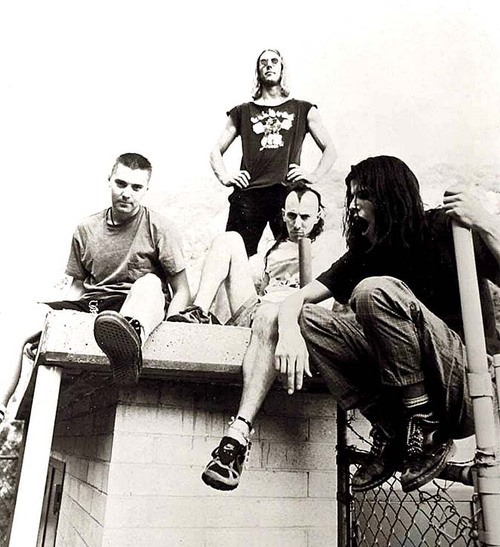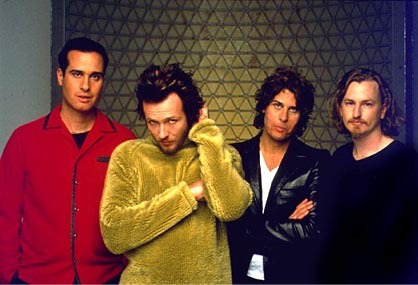Sound Familiar?
“Sober,” “Prison Sex,” “Stinkfist”
Who Are They?
Progressive metal titans widely considered to be the
“thinking person’s metal band.”
In the ‘80s, the members of what would later become Tool
were on very different paths. Guitarist Adam Jones and original bassist Paul
D’Amour were looking to enter the film industry while Maynard James Keenan was
remodeling pet stores in Michigan. Maynard and Adam met through a mutual friend
in 1989, and after being thoroughly impressed by Maynard’s singing voice, Adam
proposed they start a band together.
(Fun fact: According to Maynard, the name Tool means this:
“Tool is exactly what is sounds like: It’s a big dick. It’s a wrench. We are
[…] your tool; use us as a catalyst in your process of finding out whatever it
is you need to find out, or whatever it is you’re trying to achieve.”)
After playing a few shows in Los Angeles and being signed to
label Zoo Entertainment, Tool released its first EP, Opiate, in 1992. The band has since claimed that Opiate included the six “hardest
sounding” songs they had written up to that point.
The video for single "Hush" was actually a statement against
the PMRC and its advocacy of music censorship. It was basically a big “fuck
you” to Tipper Gore and friends in the form of Tool performing naked with
Parental Advisory signs over their naughty bits.
(Fun fact: The band only appears in two videos: “Hush” and
“Sober.” Though “Sober” is largely a stop motion animation video, you can see brief
flashes of the band at the very beginning.)
The band’s first full-length album, Undertow, was released in 1993 to critical acclaim. Appearances at
Lollapalooza boosted Tool’s success, and “Sober” became a hit single (due in
part to the incredible stop motion music video).
Undertow’s second
single, “Prison Sex,” ran into a bit of trouble. The song’s lyrics and video
(also stop motion) dealt with the tough subject of child abuse, which sparked a
healthy amount of controversy. MTV deemed the video too graphic (which is silly
since it’s largely metaphoric) and pulled it from rotation.
The band’s second album, Ænima, dropped in
1996 and propelled Tool to the head of the alternative metal scene in the ‘90s.
(Fun fact: Ænima was dedicated to
comedian Bill Hicks because Maynard and company felt that Tool and Hicks were
“resonating similar concepts.” The song “Third Eye” includes a clip of one of
Bill’s performances.)
Where Are They Now?
At the tail end of promotion and touring
for Ænima, Maynard joined the band A Perfect Circle, which was founded
by Tool guitar tech Billy Howerdel. A Perfect Circle was more of an alternative
rock venture than a progressive metal one, and found mainstream success with
2000’s Mer de Noms.
Meanwhile, Tool began recording Lateralus,
which was released in 2001. Despite its complexity and art rock vibe, the album
debuted at number one on the Billboard 200 chart. "Schism," which has since
become Tool’s signature song (along with “Sober”), won the Grammy for Best
Metal Performance in 2002.
At the end of the Lateralus tour,
Maynard went back to A Perfect Circle to release Thirteenth Step. This
prompted fans to believe that Tool was on hiatus.
(Fun fact: On April 1, 2005, the offical
Tool site announced that “Maynard has found Jesus” and would no longer be
recording with Tool. MTV’s Kurt Loder contacted Maynard for confirmation, but
only received a response simply stating, “Heh heh.” It was, in fact, an April
Fool’s joke.)
Tool’s fourth studio album, 10,000 Days, was released in 2006 to mixed reviews. After extensive
touring, the band took a break and Maynard started yet another side project called
Puscifer, which he considers his “creative subconscious.” Puscifer released two
studio albums (2007’s “V” Is for Vagina and
2011’s Conditions of My Parole) and
toured a large part of the US.
But Why Tool?
Drummer Danny Carey just confirmed that the new album is
over halfway finished and may possibly be released this year!
What Does Sam Think?
Tool isn’t your average metal band. Actually, Tool isn’t
your average prog metal band either. When I hear “progressive metal,” I think
of Dream Theater or Isis. Tool doesn’t sound anything like either of those
bands. (But if you seriously want to know more about metal as a whole, check
out Justin Silk’s blog. He’s more of an expert than I am.)
This band sounds like one big experiment, except the
solution is always the same—no matter what dangerous chemical you throw into
the mix, the result will always be perfectly stable.
Once Maynard and friends released two prog metal albums,
they decided to change things up with Lateralus.
That album has a lot of art rock influence, especially on “Schism.” But does it
sound chaotic? No. Does it sound boring? Not a chance. It’s still a metal
album, but it’s only heavy in the right places.
Take “Parabol” and “Parabola” for example (these two songs
are meant to be heard in immediate succession). “Parabol” is a really delicate
track. It sets the scene for “Parabola,” which is much heavier. But “Parabola”
actually ends with a droning guitar riff that almost echoes the tranquility of
“Parabol.” They kind of answer each other. I know that sounds way too
complicated for a metal song, but that’s what Tool is all about.
And you can’t talk about Tool without mentioning the music
videos. If you’ve never seen a Tool video before, stop what you’re doing and
watch one. I’ve got links to them all over this post, so there’s no excuse not
to check one out (and don’t let the lengths scare you away). Yeah, they’re
pretty surreal and at times a little frightening, but they’re some of the
coolest videos I’ve ever seen. And I always find some meaning in them (but
perhaps not the band’s intended meaning).
My favorite video is probably "Parabola," followed closely
by “Prison Sex.” The imagery in “Prison Sex” is a bit easier to grasp since we
already know it’s about child abuse. “Parabola” is a little tougher to explain,
so I’ll just let you explore that yourself.
But if Tool isn’t your cup of tea, you have two other
Maynard Keenan side projects to choose from. If you like modern rock with an
art rock edge, give A Perfect Circle a try—it’s the more accessible project, in
my opinion.
If you want to get weird, try Puscifer. That project is a
nice mix of ambient, post-industrial, trip-hop and comedy rock. Not as chaotic
as you’d think, though. (Also, I just really want to share this cover of “Bohemian
Rhapsody” with you.)
-- Sam Boyer,
reporting from the ‘90s.





